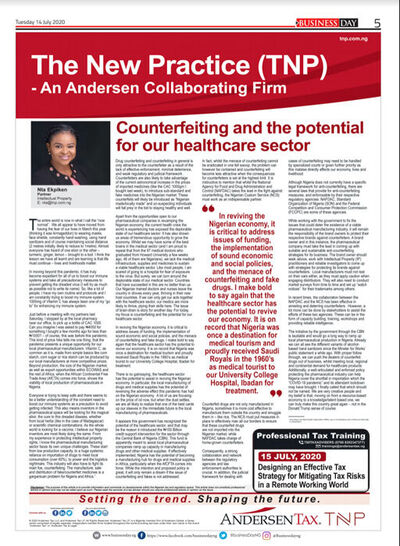The entire world is now in what I call the “now normal”. We all appear to have moved from having the fear of our lives in March this year (thinking it was Armageddon) to wearing masks, face shields, constantly hand-washing, using hand sanitizers and of course maintaining social distance (2 metres initially, likely to reduce to 1metre). Almost everyone has heard of one elixir or the other – turmeric, ginger, lemon – brought to a boil. I think the lesson we have all learnt and are learning is that life must continue – lives and livelihoods matter.
In moving beyond this pandemic, it has truly become expedient for all of us to boost our immune systems and take all precautionary measures to prevent getting the dreaded virus (I will try as much as possible not to write its name). So, like a lot of people, I have my own routine and protocols and I am constantly trying to boost my immune system. 1000mg of Vitamin C has always been one of my “go to” for enhancing my immune system.
Just before a meeting with my partners last Saturday, I stopped by at the local pharmacy near our office, to pick up a bottle of CAC 1000. Can you imagine I was asked to pay ₦4000 for something I bought a few months ago for less than ₦1000? – of course, this was before this pandemic. This kind of price hike tells me one thing, that the pandemic presents a unique opportunity for our local pharmaceutical manufacturers. Vitamin C, as common as it is, made from simple basics like corn starch, corn sugar or rice starch can be produced by our local manufacturers at more competitive prices. Beyond production, the size of the Nigerian market, as well as export opportunities within ECOWAS and the rest of Africa, when the African Continental Free Trade Area (AfCTA) comes into force, shows the viability of local production of pharmaceuticals in Nigeria.
Everyone is trying to keep safe and there seems to be a better understanding of the constant need to boost our immune systems as a precaution to avoid getting infected. This also means inventors in the pharmaceutical space will be looking for the magical elixir, the cure to this dreaded disease, whether from local herbs (like in the case of Madagascar) or scientific chemical combinations. As the whole world is looking for a vaccine, I believe our Nigerian inventors are most likely doing the same. From my experience in protecting intellectual property rights, I know the pharmaceutical manufacturing sector faces its own unique challenges. These start from low production capacity, to a huge systemic reliance on importation of drugs to meet local consumption (over 60%), to power and the logistics nightmare. This industry will also have to fight its main foe, counterfeiting. The manufacture, sale and distribution of fake/counterfeit medicines is a gargantuan problem for Nigeria and Africa.1
Drug counterfeiting and counterfeiting in general is only attractive to the counterfeiter as a result of the lack of effective enforcement, minimal deterrence, and weak regulatory and judicial framework. Counterfeiters are also likely to take advantage of the current astronomical increase in the prices of imported medicines (like the CAC 1000gm I bought last week), to introduce sub-standard and fake medicines into the Nigerian market. These counterfeits will likely be introduced as “Nigerian made/locally made” and un-suspecting individuals will fall prey in the bid to staying healthy and well.


